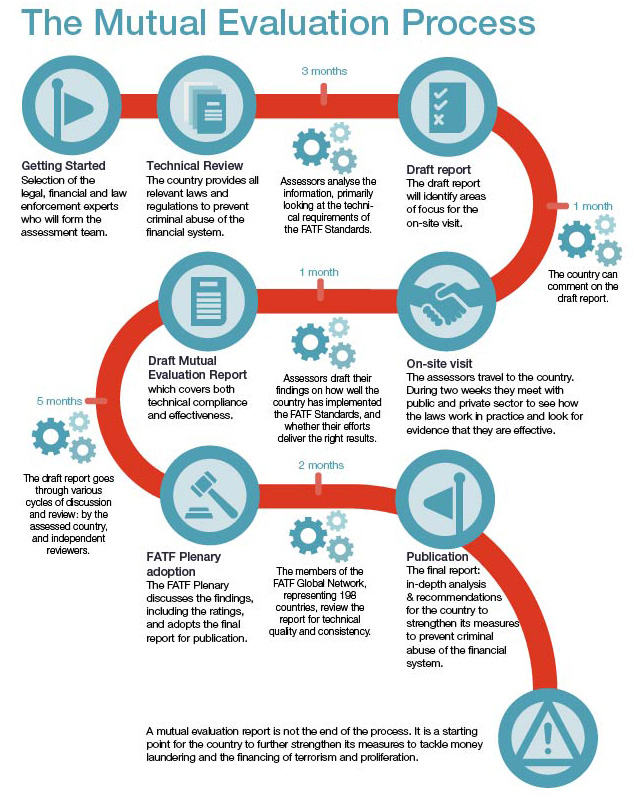FATF mutual evaluations are in-depth country reports analysing the implementation and effectiveness of measures to combat money laundering and terrorist financing. Mutual evaluations are peer reviews, where members from different countries assess another country. A mutual evaluation report provides an in-depth description and analysis of a country’s system for preventing criminal abuse of the financial system as well as focused recommendations to the country to further strengthen its system.
Mutual evaluations are strict and a country is only deemed compliant if it can prove this to the other members. In other words, the onus is on the assessed country to demonstrate that it has an effective framework to protect the financial system from abuse.
Mutual Evaluations have two basic components, effectiveness and technical compliance.
- The main component of a mutual evaluation is effectiveness. This is the focus of the on-site visit to the assessed country. During this visit, the assessment team will require evidence that demonstrates that the assessed country’s measures are working and deliver the right results. What is expected from a country differs, depending on the money laundering / terrorist financing and other risks it is exposed to. To ensure consistent and fair assessments, the FATF has developed an elaborate assessment methodology.
- The assessment of technical compliance is part of each mutual evaluation. The assessed country must provide information on the laws, regulations and any other legal instruments it has in place to combat money laundering and the financing of terrorism and proliferation. This used to be the main focus of FATF, and FATF still requires the legal framework to be in place. But experience has shown that having the laws in the books is not enough, the main focus is now on effectiveness.
The mutual evaluation report is an assessment of a country’s measures to combat money laundering and the financing of terrorism and proliferation of weapons of mass destruction. This includes an assessment of a country’s actions to address the risks emanating from designated terrorists or terrorist organisations. The mutual evaluation report is without prejudice to the status or justification that led to the designation of an entity as a terrorist or terrorist group or organisation.

A complete mutual evaluation takes up to 18 months. The stages in this process are as follows:
- Assessor training. The FATF organises regular training to train experienced national experts in the The FATF Recommendations and FATF issues new Mechanism to Strengthen Money Laundering and Terrorist Financing Compliance. FATF does not restrict itself to assessors from FATF countries, all countries that are part of the of FATF and FATF-style regional bodies and FATF observer organisations can provide experts for assessments.
- Country training. The FATF organises training for representatives of the assessed country so that they know what they will need to provide and demonstrate during the process.
- Selection of assessors. The FATF selects the members of the assessment team from the pool of trained assessors. The composition of the team depends on the required expertise for an assessment, including language and legal background. Assessors are appointed by the President, assessed countries do not have a say in the selection.
- Technical compliance. The country provides information about its laws and regulations. The assessors analyse this information, checking if all the required laws and regulations, as required by the FATF Recommendations, are in place. This analysis takes approximately 4 months, sometimes longer if translations or additional documents are required. Following the analysis, assessors produce a draft report, with technical compliance ratings for all 40 Recommendations.
- Scoping. In preparation for the effectiveness assessment and the on-site visit, assessors undertake a preliminary scoping exercise to determine the areas of focus of the on-site visit. Elements that are factored in are the type of threats, vulnerabilities and risks, the type of economy, the size type of financial and other sectors, political stability and commitment, the rule of law, and the level of maturity of the country's system to combat money laundering and the financing of terrorism and proliferation.
- On-site visit. The assessors travel to the country for the on-site visit. Before, during and after the visit, the country needs to provide information on the effectiveness of its system in all eleven areas that are covered by the FATF Methodology (more information on An effective system to combat money laundering and terrorist financing). Prior to the on-site visit, the assessed country provided information on the efectiveness of their system to aid in the discussions.
- Report drafting. Immediately following the on-site visit, the assessors finalise the mutual evaluation report with the findings of the effectiveness and technical compliance assessment. The assessed country is given the opportunity to comment on the draft report, and have a face-to-face meeting with the assessors. The report is also reviewed by independent reviewers. But ultimately, the assessors are the only ones who decide on the text of the report and the final proposed ratings for effectiveness and technical compliance.
- Plenary discussion. The assessors present the draft report to the FATF Plenary at one of the three meetings it holds every year. The Plenary will discuss the assessors’ findings and proposed ratings. Consensus among members (except for the assessed country, which has no vote) is required to overrule any of the draft findings and ratings by the assessors.
- Final quality review. Following Plenary approval, all countries within the will review the report for technical quality and consistency before it is published on the website, which is usually two months after Plenary approval.
- Follow-up. After adoption, the countries are required to address the shortcomings identified in the report. All countries are subject to post-assessment monitoring. This can include anything from regular reporting of improvements for countries that are already largely compliant and demonstratively committed to addressing the remaining few shortcomings, to issuing a public warning against a country that makes insufficient progress to address key deficiencies.



 Twitter
Twitter
 Facebook
Facebook
 Instagram
Instagram
 Linkedin
Linkedin
